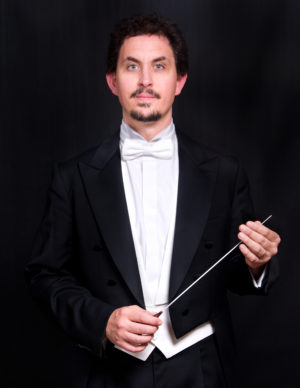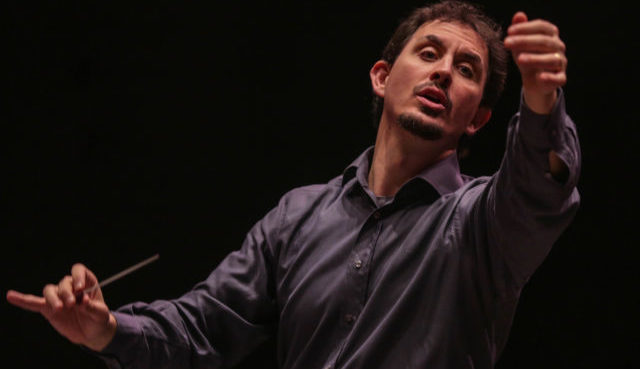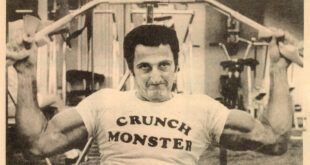Passionate about opera in general and lesser known Italian works in particular, Emanuele Andrizzi has set his sights on launching the Midwest’s first opera festival.
Conductor, composer and pianist Dr. Emanuele Andrizzi caps his emails with the declaration of another Italian artist, World War I-era writer Gabriele D’Annunzio: “Ama il tuo sogno se pur ti tormenta,” or “Love your dream even though it torments you.” It’s a refreshing tonic to the somewhat mushy 21st-Century mantra “do what you love.” And it defines Andrizzi’s steady path toward artistic mastery.
Grit and persistence characterize Andrizzi, who started learning his craft, honing his skills and earning his credentials as a teen, considered late for a classically trained pianist. It was grueling and tortuous work, but it paid off. Having previously conducted for the Lyric Opera of Chicago, San Diego Opera, Chicago Opera Theater, Opera Theater of St. Louis, Orchestra della Città di Ravenna, Cluj Symphony and Chicago Philharmonic, he now serves as director of orchestras for Roosevelt University’s Chicago College of Performing Arts, as well as music director and conductor with the McHenry County Youth Orchestra. Andrizzi also has big plans to mount an area-wide opera festival to rival those in other major American cities.
Energetic and full of good humor — he likes to joke that he’s “the second most famous Italian conductor in Chicago” after the CSO’s Riccardo Muti — Andrizzi took time from a booked schedule to discuss his rise through the musical ranks, his current work and how he hopes to turn his love of opera into a gift for music lovers in the Midwest.
 Lou&A: Tell us about your upbringing and how music entered the picture.
Lou&A: Tell us about your upbringing and how music entered the picture.
Emanuele Andrizzi: I grew up near Rome and lived there until I was about 30. My mom used to play piano as an amateur when she was really young, and my parents would bring me to symphonic concerts. I wanted to become a pianist, but things were a little rough and they couldn’t afford to send me to lessons. But I really wanted it, and I started at 14.
My piano teacher was one of those very serious people, and he said, “You can try, but kids who want to be real musicians start at 7 or 8.” But I told him, “I’m really passionate about it.” It was hard to make up the lost time, even though I was playing 8 to 10 hours of piano a day.
L&A: And at some point, you decided to pursue conducting. How did that come about?
EA: I had been thinking about a career as a pianist but because I started late, I didn’t have the easiness that people had who started younger. I was also an organist in my church, and at some point I was even thinking of becoming an organist and played on some of the best organs in the world.
But at the time there wasn’t a musical high school, so you had to study privately until you finished high school. Then I started thinking seriously about conducting; I started the conservatory when I was 19, and I got my performance diploma when I started to study for conducting.
In Italy it takes a long time to become a conductor; I took 10 years of piano, 7 years of composition and at some point the two things overlapped, but that’s what you have to do before you can even start to train for conducting.
L&A: So what happened once you finished your training in Italy?
EA: I was pretty tired at that point, so I moved to Bard College in New York for 15 months to do a master’s in conducting. After that I started working in a professorship in Portugal, in Porto, then I got married and decided to go back to Italy for a year to conduct. But the musical climate at the time in Italy wasn’t the best, and friends were telling me that to be a conductor, the best path was either to go to Germany or America. I asked my wife if she wanted to go to America or learn German. And guess what she said? [Laughs]
L&A: So what happened once you came back to the U.S.?
EA: I moved to Chicago in 2007 to do my doctorate at Northwestern University and got a full ride orchestral conducting. I didn’t even have an idea what American schools cost. It was a great opportunity. It was also a big discovery. What blew me away was that I had arrived a week early and my teacher at Northwestern said, “I’m going on a tour with another orchestra for the next few weeks, so here are the rehearsal dates for the orchestra here. Do you want to conduct while I’m away?” And I said, “Holy cannoli!” [Laughs.] There arrived a moment when I said, “I really love this.” It’s how you learn the job, how you pay your dues.
L&A: Tell us about your music work at Roosevelt University.
EA: I don’t directly have a conducting class, but I’m the head of the orchestral program where I prepare students for a career in orchestra. At the same time, I have multiple orchestras, and I design their teaching and prepare all the students. So far it’s also given me time to do professional work outside, to do gigs with professional companies in San Diego and St. Louis.
L&A: Then there’s your dream project in opera.
EA: Of course my heart as an Italian beats in the opera. It’s how I grew up, with my grandmother singing arias. When you discover opera, it’s like the day you discover Nutella. [Laughs.] There’s so much great repertoire in opera that hasn’t been presented in Chicago, and that’s my dream job: to present that opera in Chicago. I’ve worked in so many languages: English, French, Russian and Italian. But I’d love to find the undiscovered or little-heard Italian operas and present them here.
I call the project the Opera Festival of Chicago, or OFC. Projects like this have been doing well in other big cities — New York, Boston, Houston and Philadelphia. You can explore so many things in just a few dates: conferences on the music, concerts in museums. It’s very doable, and it seems Chicago offers so many possibilities. I have been working with a team of colleagues and friends for several months now. I’ve been in touch with singers from the area, and I have a lot people getting very excited about it — young singers who are here because Chicago is so rich in its culture. So I’m very optimistic, though since I’m Italian, I only learned to be optimistic when I moved here. [Laughs]
L&A: It sounds like something your hero needs to hear about it.
EA: It’s incredible working in a city with Riccardo Muti, one of the most famous Italian conductors in the world and a great ambassador of Italian music. He’s been such an inspiration; I’d love to present my idea to him. After all, the OFC owes something to Rome. Having grown up there, with its 3,000 years of history and 2,000 years of heart, it’s a great legacy to draw on. You just can’t forget about it.
To learn more about Dr. Emanuele Andrizzi, visit emanueleandrizzi.com.
The above appears in the August issue of the print version of Fra Noi. Our gorgeous, monthly magazine contains a veritable feast of news and views, profiles and features, entertainment and culture. To subscribe, click here.
 Fra Noi Embrace Your Inner Italian
Fra Noi Embrace Your Inner Italian







